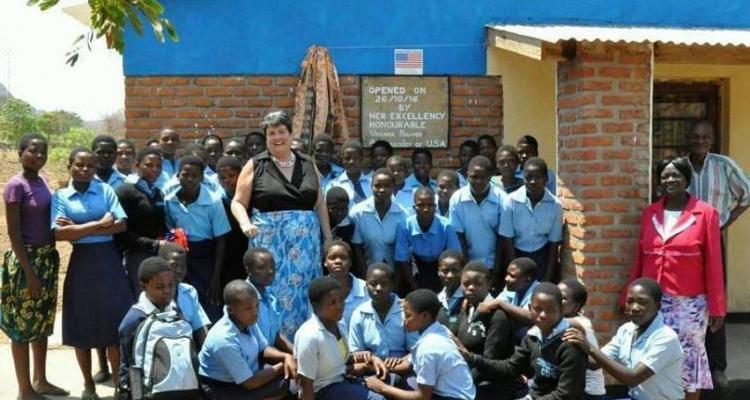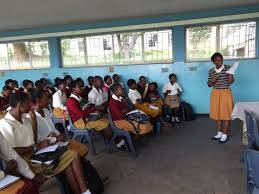
The sun sinks below the skyline and darkness is looming over the commercial city of Malawi.
Sarah Welemu would have loved to continue with her school and fulfill her dream of becoming a nurse so that she could help her community in Undi Village, T/A Machinjiri Blantyre district, a low income informal settlement bubbling with rapid population growth, in Lilongwe, which is found 200 kilometers from Lilongwe city center. Sarah is living a different childhood.
Her dream was shattered as soon as the 15-year-old completed her standard seven in 2017 and was forced to look for a job to support her poor family. “When the results were out my score grades weren’t good so my parents took me to a private school nearby our village but since we could not afford the school fess, I had no option but to start working in Limbe town in a Chinese shop as a shop attendant to support my family,” explains Sara, the oldest of eight siblings.

Human Right Watch report 2017 titled “I Had A Dream to Finish School” shows that many children are barred because they fail the compulsory primary school leaving examinations. This is because those who fail are not allowed to retake the exam, failing it once typically ends their school years. Since 2012, exams results have affected approximately 1.6 million children’s access to secondary education. Most have not been allowed to repeat standard 8, the final year of primary school. Once out of school, many adolescents lack realistic options to complete basic education or pursue vocational training.
This has been the case for Sara, who is extremely aggrieved to see other girls of her age going to school as she works at Chinese shop eking K20, 000 a month. “I see my dream shattered, unable to go to school because of poverty.” I want to study and become a nurse,” she comments adding that she works for more than eight hours a day, “I stop working in the evening because the place is not safe for girls to stay up until dark as I walk from Limbe to reach my village in Machinjiri on daily basis.
The amount I earn helps out at home to buy food she explains with a sad expression on her face.
Sara’s case is one among many cases facing young girls in Malawi. Many researches have shown that during adolescence, factors such as menstruation, gender-based violence, and early pregnancy and marriage force many girls to drop out of school. Other obstacles prevent girls from even making it to school in the first place. including poverty, disability, and cultural practices.

The case is the same for Triza Yahaya, 19, a mother of one who was forced to stay out of school at the age of 11 because of extreme poverty that existed in her family upon demises of her father a Truck driver. Being the first born in a family of two, Triza spent most of her teen years caring for her sibling and her family including finding jobs in saloon to earn money to support her family.
Meeting her for the first time at her home in Ndirande Malabada within Blantyre city, Triza looked older than her age, a sign that she has worked hard to make a living in the toughest way possible.
“Life hasn’t been easy for me and my family, because poverty. I couldn’t continue with school since my family and I had to work hard to earn a living. Poverty has seen many of my friends move to town to look for jobs, some have ended up into prostitution, but for me, I had to come and work here at the Ndirande market as a hairdresser which I have been doing for the past two years.
I was born in a poor family that could sometimes go without food although I was lucky to attend primary school, I didn’t continue with school because me parents couldn’t afford some school expenses and parents didn’t see the importance of education saying they would marry me off,” she sadly explained.
Triza further laments,” I don’t earn much but it’s enough for me to support my family and three-year-old child whose father abandoned me one month after giving birth. The little I earn takes us through the day but it is not sufficient,” she says as she picks palates customer hair.
Sara and Triza are among many girls who are forced to drop out of school because of poverty which has prevented them from getting education because of the need to work to boost their families’ income and their parents cannot afford to pay extra costs such as uniforms, books and transport.
The recent Human Right Watch report shows that until recently, many families did not enroll their children in secondary school because they could not afford school fees and related expenses, often costing more than K50,000 per year. But in democratic dispersion, Malawi’s new government took a crucial step; it abolished all school fees and contributions plus additional charges by school to pay for the schools running costs, previously required to enter lower-secondary schools in the country.
According to report, two in five adolescent are out of school in Malawi, even though the country has declared education a nation priority and abolished school fees in all government primary schools. Lack of money is mentioned to be one of the reasons why education ends after primary school for so many young people in Malawi. Barriers include exams that limit access to secondary schools and long distances to schools.
It is estimated that a total of 5.1 million children aged 7 to 17 are out of school, including nearly 1.5 million of lower secondary school age. Instead of enrolling in school, many children resort to child labour, often in exploitative, abusive, or hazardous conditions, in violations of Malawi law, to supplment their family’s income. Girls also face many challenges on account of their gender.
Hellen Kadango, primary school head teacher in Blantyre said poverty has been the greatest barrier to accessing an education particularly for girls. She said most parents, because of poverty are not highly motivated to take their children to school and instead allow them to engage in doing some labour job to make a living.
“The financial burden of education for those living in poverty include the direct costs such as school fees, uniforms, shoes, books, transportation, and the cost of a child being in school. Due to the location of the school (located along the highway) hence there are lots of business opportunities, what happens is most of these young girls and boys are forced to do manual works so that they can help contribute to the household income. Even if institution is free, most families earn less for them to afford all the other expenses, “She explains.
In order to help out poor girls stay in school, a number of interventions are needed to make it happen and Ulala Kondowe, a girls activist based in Blantyre – founder of Girls Network Malawi is of the opinion that any plan to promote education for girls must consider a number of things on how to reduce extreme poverty at the family level.
“To come up with a plan which will look deeply on solutions that will support families who are struggling to survive hence affect girls education, we have to critically think on how to defeat poverty starting at the family level because it holds so many girls back,” says the activist, adding, “some of the interventions that I see can help the poorest girls stay in school include incentive programs, which give financial support to cover school costs, and school feeding programs.”















I am so sad concerning the lack of support these smart, young people get. They desperately want to build a better life for themselves, their families, communities, and country.
What they learn in school is a fruitful stepping stone to be the best they can be. Isn’t that what we want/wanted for ourselves, Children, Grandchildren and Great-Grandchildren?
Some people, all over the world, are experiencing being poor
and becoming destitute. I was born and raised in the United States of America and I am appalled at what I see. Good people, young and old alike are homeless. Some have a tarp or tent for shelter while others a blanket or sleeping bag, at best. Hopelessness is running rampant. GOD be our Comfort and our Guide. Let nothing not any one tear us down. Let us walk in triumph
To be honest the government of Malawi has failed the Malawians